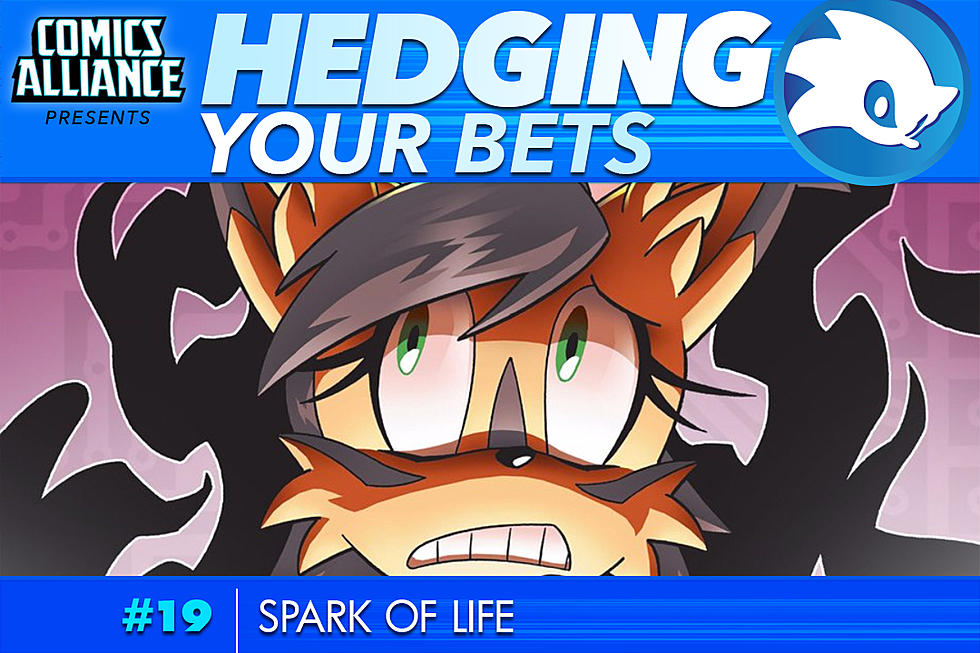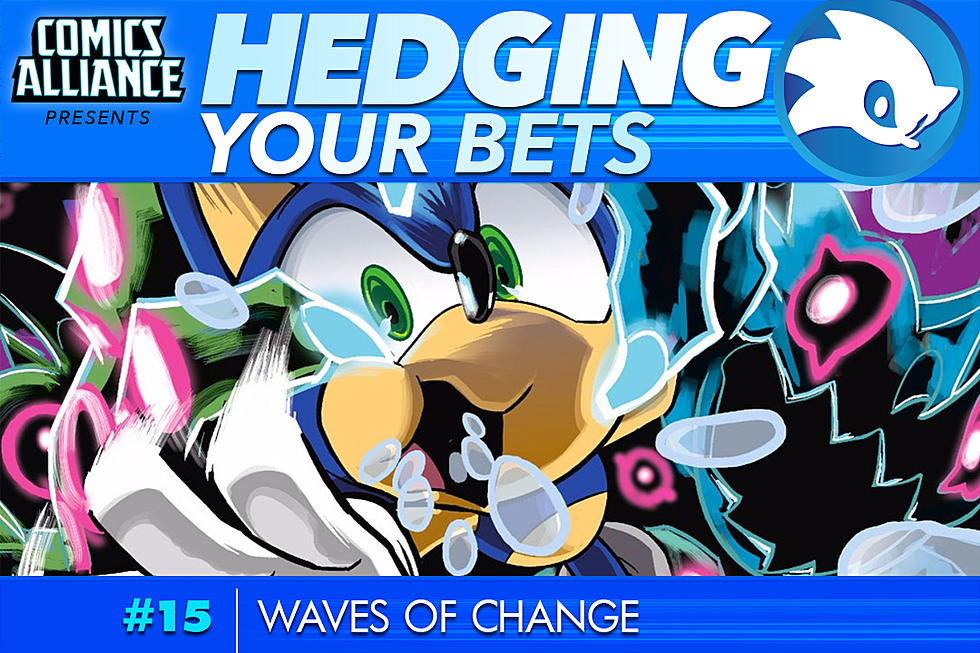
Hedging Your Bets #1: Countdown To Genesis
With almost 300 issues in the core series, Archie's Sonic The Hedgehog stands as the longest-running uninterrupted American monthly comic book that's currently being published. Because of that, it's a surprisingly significant title in the annals of mainstream comics --- and it's also one that I know almost nothing about.
But never let it be said that I let a gap in my comics knowledge go unaddressed, no matter how wary I am of the subject matter. Thus: Hedging Your Bets, where I attempt to get up to speed on Sonic the Hedgehog, challenging the odds to hopefully make it all the way to the finish line.
This week, we get started at Sonic #221, and folks... I have questions.
Sonic the Hedgehog #221-225: "Countdown To Genesis"
Story: Ian Flynn
Art: Ben Bates, Steven Butler, Tracy Yardley, Terry Austin, Matt Herms, Patrick "Spaz" Spaziante
Lettering: John Workman
Editor: Paul Kaminsky
We haven't even gotten started yet, and already, the very premise of this column is proving to be surprisingly controversial.
After I laid out the plan to start reading Sonic the Hedgehog with the "Genesis" story arc in Sonic #226 and work my way towards the present, a lot of readers got in touch to tell me that this is not the best idea I've ever had. Despite the fact that, historically speaking, things called "Genesis" have been a pretty good starting point, I was told time and time again that this is actually one of the worst places to jump on in a book that otherwise goes out of its way to give new readers entry points. And every one of these warnings came with a different suggestion on where to get started.
I had some readers telling me I should go all the way back to #25 (which would give me around 250 issues to catch up on if I want to actually get to the present), and plenty of others telling me that I should dip into the Ken Penders era, if only to see how weird it gets. One solid pal even went as far as giving me a reading list that he got from Ian Flynn, detailing a pretty interesting strategy of making the "milestone" issues (ie, the multiples of 25) clean jumping on points, and trying to make all of the tens pretty accessible, too.
But while I appreciate the guidance, there's definitely a part of me that likes the idea of jumping in at exactly the wrong spot. I mean, I'd like to think that after thirty years of reading superhero comics, I'm pretty good at picking up on complex storylines, even if my tendency towards being a completist often leads me to go all the way back to the beginning so that I don't miss anything. Besides, if I could do it with Transformers, a nightmare minefield of obsessive detail that's trying to cram the weirdness of a toy line into some kind of unified continuity, I was pretty sure I could do it with a porcupine that runs fast. It ain't rocket science. [Editor's note: A hedgehog is not a porcupine.]
When I went back to look at "Genesis," though, I noticed that the covers of four issues leading up to that had a "Countdown to Genesis" banner. So in deference to all the suggestions that "Genesis" itself was a bad starting point, I opted to go back a few issues, just for a little background. And having done that, I will say this.
Y'all were right. This thing is complicated.
Just look at Sonic #223. Not only does it have banners on the cover for two different story arcs, one of which is happening within the other, but there are seven footnotes in the span of fifteen pages, referencing continuity from the previous 70 issues of comics. On the one hand, that's really impressive --- I've said before that one of the things I really appreciate about Flynn's writing is that it really does pull everything together in a way that builds on itself --- but it can be a little intimidating, even for me.
Fortunately, it's not all that difficult to grasp the basics. As near as I can figure, it works like this:
These issues take place after the end of a long battle (presumably against Dr. Robotnik) that involved a siege on the city of Mobotropolis --- which I'm guessing was formerly known as Robotropolis, something I remember from reading those early comics 20 years ago. The good guys, led by Sonic and Princess Sally Acorn, were finally able to save everyone with the help of Nicole, a sentient AI that has absolute control over a citywide network of nanites that allow her to shape the city at will.
Unfortunately, there's a lot of resentment towards Nicole from the populace, owing to the fact that she was formerly used against them in the war, and it's compounded by the fear-mongering of Ixis Naugus, an evil wizard who believes that he should be in control of the town. Throw in Geoffrey, a former teammate of Sonic and Sally's who betrayed them and is now Naugus's acolyte, and there's a lot of tension over whether Nicole should be allowed to live.
And believe it or not, this is exactly what I wanted out of this book.
The one thing that I really loved about Mega Man was the way that Flynn, Bates, Spaziante and co. used the structure of an action story to get into some difficult and complicated questions that kids' adventure comics usually shy away from. That was a comic that, among other things, had a literal debate among the cast over whether it was right to create an artificial intelligence that could feel pain and loss, and dealt with ideas of forgiveness and the nature of the soul in a way that I'm not sure any mainstream adventure comic has ever tackled before.
Seeing that carry over into Sonic, where a quiet moment between larger, action-oriented arcs was dominated by a discussion of accountability for actions during wartime, and the way that the triumph over a new and powerful weapon can turn instantly into fear of what that weapon can do --- and how that dynamic changes when the "weapon" in question is, for all intents and purposes, a person.
For a comic that introduces its cast on every splash page with simple concepts like "Hero," "Tomboy Princess," and "Evil Wizard," it goes pretty deep --- and pretty dark.
It gets even more interesting when Ixis Naugus "attacks" Mobotropolis's ruling council, demanding that he be installed as king. It's a simple setup of Evil Wizard vs. Acceptably Constitutional Monarchy, but when Sonic shows up to stop him, he finds himself trapped by a government that's choosing peaceful stability over morally righteous conflict.
Straight up: I love this. Not just for building a conflict around the idea of the individual against society, and of the black-and-white morality of a battle pit against the more complicated act of rebuilding and governing, but because it underscores the central metaphor of the series. It's the simplicity of a game where you run fast and jump on a bad guy three times to win, set up against the innate complexity of a comic that's been going for 225 issues at this point, where the average issue necessitates seven friggin' footnotes. That's the kind of meta commentary blended into an action story that I can get behind.
There are, however, a few things holding it back. For one thing, as proven when he shows up to a fancy restaurant for a date without actually making his promised reservations, Sonic himself is a huge jerk.
Also, while it's not badly constructed, the apparent death of Sally Acorn in #225 probably means a lot more when you've read a couple hundred of these comics than when you've read four, and also when you don't know for a fact that she's going to eventually come back.
More than that, though, there's still an element of weirdness in this comic that I haven't quite been able to get past yet. While I have no problem picking up on who these characters are and what their role in the story is, and while I'm immediately drawn to simple stories that are built on a foundation of underlying complexity, this thing kind of lost me once Dr. Robotnik showed up for a race held by a giant God Panda.
I have no idea.
Also, while I hate to admit it, it's taking me longer than I expected to get a handle on a cast of funny animals. It's weird, I know, considering that the Carl Barks' Scrooge McDuck comics and Stan Sakai's Usagi Yojimbo are two of my all-time favorites, but something's holding me back.
I guess I just have to look at it the same way I look at those, as a world where the characters are just sort of incidentally animals, where they can exist in the absence of humans as ---
WAIT WHY IS THERE A PEOPLE IN THIS COMIC?! WHAT THE HECK, MAN?!
This Week's Odds:
- Chris finishes the entire project - 10 to 1
- Chris grows to genuinely love Sonic as a character - 100 to 1
- Chris grows to like Knuckles the Echidna way more than Sonic - 5 to 1
- Chris realizes that Dr. Robotnik was a people all along and not just some weird egg man - 2 to 1
- Chris starts referring to Dr. Robotnik as "Eggman" rather than the infinitely better "Dr. Robotnik" - 1,000 to 1
More From ComicsAlliance









